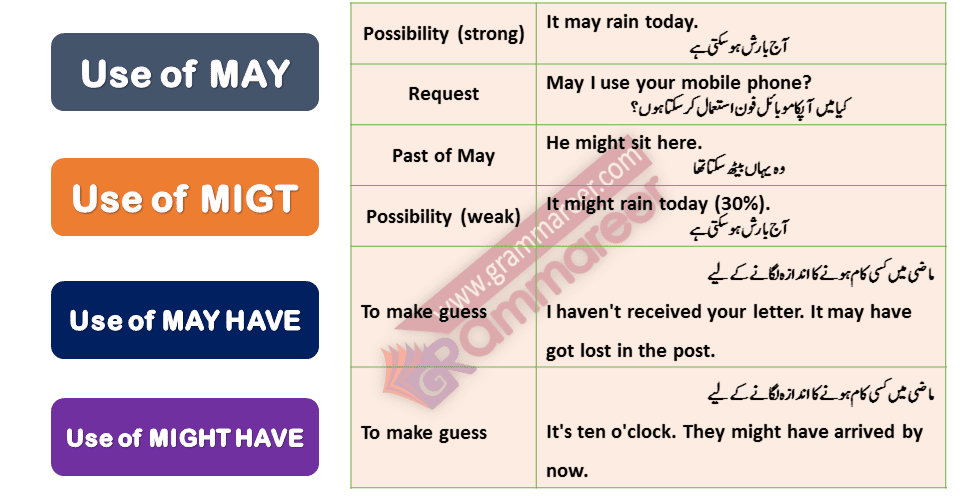Understanding how to use may, might, may have, and might have correctly can be confusing for beginners. These modal verbs express possibility, uncertainty, and politeness in different ways and tenses. In this blog post, we break down their meanings with simple explanations in Urdu to help you speak more naturally and clearly. Learn more in our grammar section.
Table of Contents
✅ Use of MAY
(امکان، اجازت یا دعا کے لیے استعمال ہوتا ہے)
🔹 To Express Possibility (Strong)
(امکان ظاہر کرنے کے لیے)
- It may rain today.
آج بارش ہو سکتی ہے۔
Aaj barish ho sakti hai. - He may come any time.
وہ کسی بھی وقت آ سکتا ہے۔
Woh kisi bhi waqt aa sakta hai.
➡️ Use when something is likely or expected to happen.
🔹 To Make a Polite Request
(درخواست یا التجا کے لیے)
- May I have some water, please?
کیا مجھے پانی مل سکتا ہے؟
Kya mujhe paani mil sakta hai? - May I use your mobile phone?
کیا میں آپ کا موبائل استعمال کر سکتا ہوں؟
Kya mein aap ka mobile istemal kar sakta hoon?
➡️ Use to ask nicely for something.
🔹 To Ask for Permission
(اجازت لینے کے لیے)
- May I go now?
کیا میں اب جا سکتا ہوں؟
Kya mein ab ja sakta hoon? - May I see this book?
کیا میں یہ کتاب دیکھ سکتا ہوں؟
Kya mein yeh kitaab dekh sakta hoon?
➡️ Use when you seek permission respectfully.
🔹 To Give Permission
(اجازت دینے کے لیے)
- They may go now.
اب وہ جا سکتے ہیں۔
Ab woh ja sakte hain. - You may take tea.
تم چائے پی سکتے ہو۔
Tum chai pi sakte ho.
➡️ Use when you’re allowing someone to do something.
🔹 To Express a Wish or Prayer
(دعا یا نیک خواہشات کے لیے)
- May you stand first in the exams!
تمہیں امتحان میں پہلا درجہ ملے۔
Tumhein imtihaan mein pehla darja mile. - May you live long!
تمہیں لمبی عمر ملے۔
Tumhein lambi umar mile.
➡️ Use to bless or wish someone success or good life.
✅ Use of MAY HAVE
(ماضی میں کسی ممکنہ واقعہ کے اندازے کے لیے)
🔹 To Guess What Possibly Happened in the Past
(گزری ہوئی بات کا امکان ظاہر کرنا)
- I haven’t received your letter. It may have got lost in the post.
مجھے تمھارا خط نہیں ملا، شاید وہ ڈاک میں گم ہو گیا ہو۔
Mujhe tumhara khat nahi mila, shayad woh daak mein gum ho gaya ho. - She may have left early due to the weather.
وہ شاید موسم کی وجہ سے جلدی چلی گئی ہو۔
Woh shayad mausam ki wajah se jaldi chali gayi ho.
➡️ Use when you are unsure but think something happened in the past.
Summary
| Expression | Function | Urdu Meaning | Example |
|---|---|---|---|
| May | Present/Future Possibility | امکان | It may rain today. |
| May | Permission Request | اجازت لینا | May I go now? |
| May | Giving Permission | اجازت دینا | You may go now. |
| May | Polite Request | نرمی سے درخواست | May I use your phone? |
| May | Wish or Prayer | دعا | May you live long! |
| May have | Guess About the Past | ماضی میں امکان | It may have got lost in the post. |
✅ Use of MIGHT
(MIGHT، MAY کا ماضی ہے اور کمزور امکان ظاہر کرتا ہے)
1. Past of MAY
- Used to express past possibility or potential.
- Urdu: May کے ماضی کے طور پر
- Example: He might sit here.
(وہ یہاں بیٹھ سکتا تھا) - Example: She might come yesterday.
(وہ کل آ سکتی تھی)
2. To Show a Weak Possibility
- Suggests that something could happen but is less likely.
- Urdu: کمزور امکان ظاہر کرنے کے لیے
- Example: It might rain today (30%).
(آج بارش ہو سکتی ہے) - Example: He might help you.
(وہ تمہاری مدد کر سکتا ہے) - Example: She might call you later.
(وہ شاید بعد میں تمہیں فون کرے)
✅ Use of MIGHT HAVE
(ماضی میں کسی واقعے کے ہونے کا غیر یقینی اندازہ لگانے کے لیے)
1. To Guess About the Past (Uncertainty)
- Shows uncertainty about something that might have happened in the past.
- Urdu: ماضی میں اندازے کے لیے
- Example: They might have arrived by now.
(اب تک وہ آ چکے ہوں گے) - Example: He might have forgotten his keys at home.
(شاید اس نے چابیاں گھر بھول گيا ہو)
✅ MAY HAVE vs. MIGHT HAVE
📌 Use MIGHT HAVE when you’re talking about a possibility that didn’t happen (with some certainty).
- ✅ Correct: Ahmad assured us he was well, but he might have been badly hurt.
(احمد نے ہمیں یقین دلایا کہ وہ ٹھیک ہے، لیکن شاید وہ بری طرح زخمی ہوا ہو) - ❌ Incorrect: Ahmad assured us he was well, but he may have been badly hurt.
❗ This usage is misleading because it suggests uncertainty without confirmation that the event didn’t happen.
🟩 Summary of Key Differences
| Expression | Function | Urdu Meaning | Example |
|---|---|---|---|
| Might (Past of May) | Past Possibility | ماضی میں امکان | He might sit here. |
| Might | Weak Present/Future Possibility | کمزور موجودہ/مستقبلی امکان | It might rain today. |
| Might have | Past Guess (Uncertainty) | ماضی میں غیر یقینی اندازہ | He might have forgotten his keys. |
| May have | General Past Possibility | ماضی میں عمومی امکان | She may have left early |
You May Also Like

